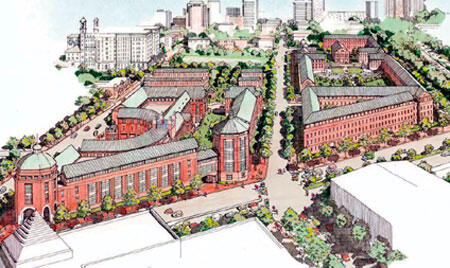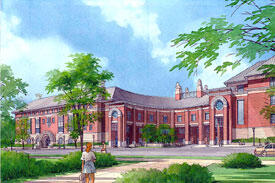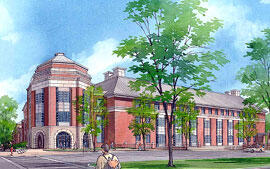Nov. 1, 2005
Groundbreaking ceremony launches VCU’s largest-ever construction project
Share this story

The day couldn’t have been more perfect, nor the crowd of several hundred more enthusiastic, for the official launch of the largest construction project in the history of Virginia Commonwealth University – the $228 million Monroe Park Campus Addition.
Groundbreaking ceremonies were held under sunny skies and spring-like temperatures at the site of the new 11-acre residential campus, adjacent to the Monroe Park Campus, east of Belvidere between Main and Canal streets in Richmond.

The first phase of the project includes construction of a new School of Business, an expansion of the School of Engineering, renovation of the historic Central Belting Building for the VCU Adcenter, the first of two residential colleges and an underground parking garage.
“What a great crowd and a great day,” VCU President Eugene P. Trani said as he opened the ceremony. “This project, when fully constructed, will transform our schools of Engineering and Business.
“This venture will help distinguish the VCU Engineering and Business schools as among the very best in the nation, producing graduates with exceptional understanding of the application of management and mathematics, science and systems, problem solving and analysis, and collaboration and teamwork,” he said.
U.S. Rep. Robert C. “Bobby” Scott, whose third congressional district includes VCU’s downtown campuses, said that VCU is a leader as an institution of higher learning and that the new campus is another example of that leadership.
“The action that VCU is taking today will ensure that Virginia holds its business and technical edge,” Scott said.
Richmond Mayor L. Douglas Wilder said the new campus will bring about significant economic development.
“On behalf of a grateful community, we thank you for investing in us,” Wilder said. “You can’t find any university in this nation in a city that has more vibrancy than Virginia Commonwealth University.”
Trani said that the new campus is a true public-private partnership. Phase I of the project is estimated to cost $165 million. The state appropriated $25.3 million for the project and university funding and income generated from student housing, parking and food services are estimated to generate more than $60 million. The remainder, more than $79 million or about half of the estimated cost, will be funded through private donations to the campaigns for Business, Engineering and the VCU Adcenter.
“I want to acknowledge the great work done by the Business and Engineering foundations through their representatives on the joint committees who have spent countless hours working on land acquisition plans, budgets and designs for the buildings,” said Edward Bersoff, Ph.D., VCU Rector and trustee of the School of Engineering Foundation.
State Sen. Walter Stosch said these “real world” partnerships and commitments led to millions of dollars in state support for the VCU schools of Business and Engineering.
The fundraising campaigns for the schools of business and engineering have reached 75 percent and 87 percent of their goals, respectively. The campaigns were boosted by $43 million pledged to the campaigns by William and Alice Goodwin, Jr., and by Steven and Kathie Markel.
Goodwin is the president and CEO of CCA Industries and founding chairman of the School of Engineering Foundation. Markel is vice chairman of the Markel Corporation and founding chairman of the School of Business Foundation.
“Kathie and I made our gift to this campaign because we believe in the new vision of the VCU School of Business,” Markel said. “The vision of collaboration with the high-quality School of Engineering in a magnificent new facility is very exciting.”
Goodwin recounted a breakfast meeting with VCU President Trani who first brought up the idea of a “small building” for an expansion of the School of Engineering. “The next thing I knew he had a big plan, and here we are,” Goodwin said.

The business and engineering buildings will be joined by an atrium and student commons. The new facilities will allow the schools to add about 2,000 students.
The 130,000-square-foot School of Business will include a trading room, tiered case-study classrooms, team building rooms, an auditorium, a career center, a corporate education center, faculty offices and a café.
The 115,000-square-foot School of Engineering expansion will include state-of-the-art lecture halls, more than 60 research and teaching labs, student meeting and study spaces, classrooms and faculty offices.
“The school and our students will make you proud of this investment in our collective future,” said School of Business Dean Michael L. Sesnowitz. “It is the goal of the VCU School of Business to become nationally recognized as the leading technologically focused business school in the Commonwealth of Virginia.”
Robert J. Mattauch, dean of the School of Engineering, said that VCU is formalizing a substantive partnership between two disciplines that traditionally have not been aligned at American universities.
“Dean Sesnowitiz and I have been working together to set an example on a national stage, and we have designed programs for our students that will make them extremely attractive to all businesses and engender within those students a practical but entrepreneurial leadership spirit that will create new intellectual and physical capital for this country,” Mattauch said.
Renovations to the Belting Building for the Adcenter, VCU’s graduate program in advertising, are expected to be complete in early 2007. The business and engineering buildings and the 800-car underground parking garage are targeted for completion in late August 2007. The first 400-bed residential college is expected to be opened for fall semester 2008.
Construction is not yet scheduled for Phase II of the project, which will include the second residential college and an executive conference center.
Subscribe to VCU News
Subscribe to VCU News at newsletter.vcu.edu and receive a selection of stories, videos, photos, news clips and event listings in your inbox.









